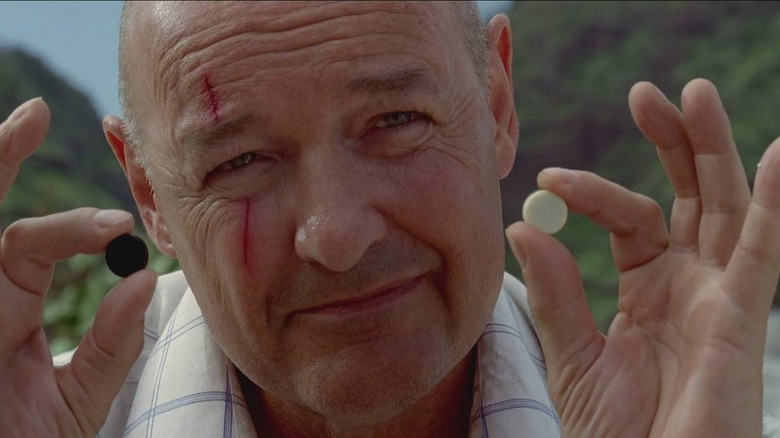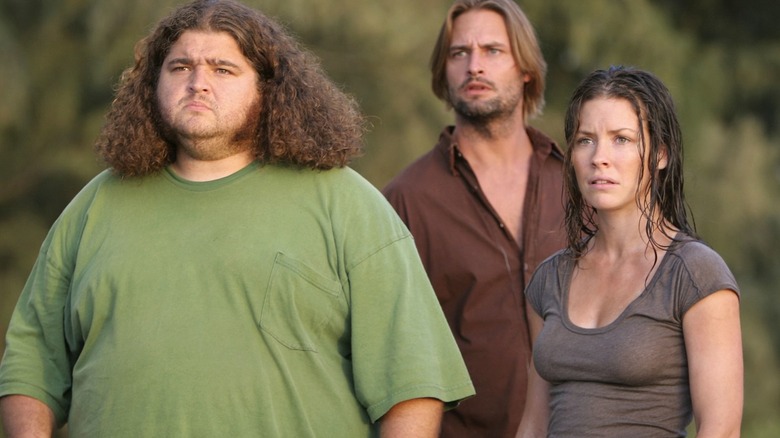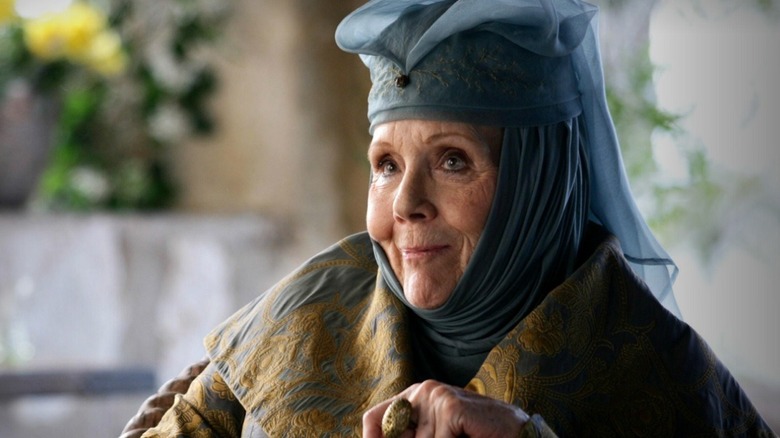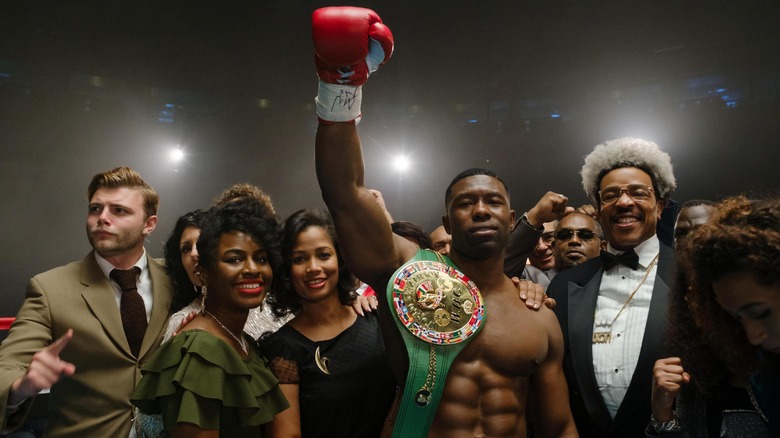TV Show Creators Who Lied To Get Their Shows Made
Generally speaking, nearly every profession on the planet contains a handful of people who lied their way into the job – whether by lying during an interview, falsifying their resume, or giving false information about what they plan to do upon securing the position. As one might expect, the entertainment industry is no different, as over the years there have been plenty of actors who blatantly lied to get the part.
A few notable examples include Chris Hemsworth (who once lied about his height to earn a part in Ron Howard's "In the Heart of the Sea") and Robert Pattinson, who spent a large portion of his early career pretending to be American. Perhaps more impressive (and far more risky) are the stories of showrunners who have lied about their shows when pitching to a network, presenting false information about a show's story, budgetary needs, and content in order to get greenlit for production. These can range anywhere from small white lies about story, to full-blown scandals wherein the show creators are lying to the studio and the public for the sake of entertainment. Here are a few examples of TV show creators who lied to get their shows made.
JJ Abrams and David Lindelof lied to sell Lost to ABC
"Lost" centers around a group of survivors who find themselves stranded on a mysterious island in the aftermath of a plane crash, though as the series goes on the island's supernatural elements transform the story into an epic science fiction tale of survival, mystery, and overlapping timelines.
Things get out of hand fast once the island's true nature is revealed, which is perhaps why show creators Damon Lindelof and J.J. Abrams lied to ABC about the convoluted story arc of "Lost." Because ABC was trying to move away from serialized dramas in 2003, Abrams, Lindelof, and the rest of the writing team simply lied about the show's story – claiming that each episode would be its own thing, and that viewers wouldn't need to watch any previous episodes to tune in on any given week. As the show's complex nonlinear narrative is hard to follow even when you have seen all of the prior episodes, it's safe to say this was a huge lie.
Several other lies from this initial pitch included the claim that everything supernatural on the island would be backed by science, the claim that the infamous "smoke monster" would be explained in the first season, and the wildly optimistic claim that the show would not shoot on location. While these lies did earn the writers a series order (and helped spawn one of the most popular shows of all time), it's safe to say that Abrams and Lindelof took some creative liberties with their pitch for "Lost."
Matt Groening needed a lie to get The Simpsons a full season
Now that "The Simpsons" has been on air for over thirty years, it seems a little funny that Matt Groening and James L. Brooks had to fight tooth and nail to get the series on television in the first place. Although Groening was initially approached by Fox after the success of his comic strip "Life in Hell," the network initially only wanted to order 6 episodes of the series instead of a full season of 13.
It was Fox executive Garth Ancier who helped to push the other executives towards a full season order with a "little white lie" — telling Barry Diller (the then-CEO of 20th Century Fox and the founder of the Fox network) that ABC was also offering "The Simpsons" six episodes. "In fairness, because I do think Barry has an extraordinary bulls*** meter, I think he knew it was a lie and went along with it anyway knowing this was a good idea," Ancier later in the ViceTV documentary "Icons Unearthed: The Simpsons." Regardless of whether Diller saw through this lie, the end result was the same: "The Simpsons" was ordered for 13 episodes and went on to become the perhaps the most iconic animated series in television history, currently holding the Guiness World Record for longest running animated sitcom.
While this incident didn't involve any lies about the storyline or content of the series, it still represents one of the more daring lies on this list – simply because it required Ancier to lie right to the face of the most important man at Fox.
The showrunners for Game of Thrones promised no big battles
Although David Beioff and D.B. Weiss helped spawn one of the most lucrative television franchises in history when they adapted George R.R. Martin's epic fantasy saga, "A Song of Ice and Fire," for HBO, diehard "Game of Thrones" fans will know that the series was only greenlit because the duo lied about the content of the original novels.
In the 2020 nonfiction book "Fire Cannot Kill a Dragon" (which tells the behind the scenes story of "Game of Thrones" from its initial pitch to its final season), the duo admitted that they originally pitched the series as a self-contained drama focused on the characters – and promised that the series would shy away from enormous (and costly) battle sequences like other fantasy epics. "We knew that most of the people making the decisions were not going to read four thousand pages [of "A Song of Ice and Fire"] and get to the dragons getting bigger and the [major battles]," explained Weiss. As was the case with "Lost," the immediate, enormous success of "Game of Thrones" helped to soften the blow when HBO finally found out about all of the gigantic action setpieces down the road, as well as the enormous CGI dragons that would raze Westeros in later seasons.
While Weiss and Benioff certainly got away with their "self-contained, character-driven drama" excuse (very similar to the one used by J.J. Abrams and company on "Lost") it's safe to say they took a pretty serious gamble when they hoped that nobody from HBO had read the books.
Mike Tyson claimed that Hulu lied about his involvement with Mike
Where some show creators had to invent little white lies in order to get the studio to bite, the scandal surrounding Hulu's "Mike" is a bit more serious – as retired boxing legend Mike Tyson claims that Hulu lied to his friends and to the World Boxing Council in order to get the series made. The 2022 TV Miniseries chronicles the tumultuous life and boxing career of Mike Tyson in a dramatized fashion, though allegedly the showrunners went ahead with the show without the involvement or consent of Mike Tyson himself.
Before the series could even debut, Mike Tyson took to Twitter to condemn the production, saying: "Someone should get fired from Hulu. Producers were lying to my friends saying I supported the unauthorized series about my life." Another tweet from Mauricio Sulaiman, president of the World Boxing Council, claimed that the WBC was misled by Hulu and subsequently provided championship belts for the show. Tyson followed up these claims in an Instagram post in which he praised Dana White for denying a Hulu promotion for "Mike," referred to the show as a "Slave Master Take Over Story About My Life" – emphasizing once again that Hulu did not have permission to tell his life story.
Although no legal action has been taken by Tyson for these alleged lies to his friends and the WBC, the allegations certainly make it seem like the team behind "Mike" used plenty of creative leeway in securing material for their show.




